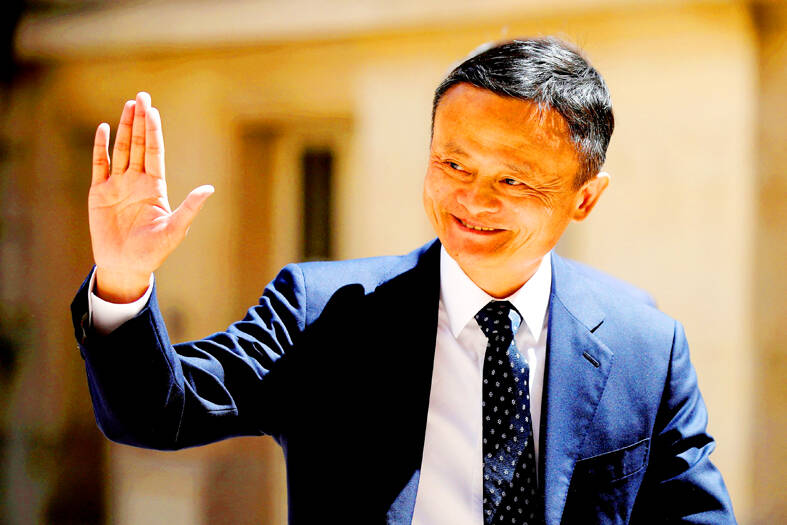Alibaba Group Holding Ltd (阿里巴巴) founder Jack Ma (馬雲) has been living in Tokyo for almost six months after disappearing from public view following China’s crackdown on the tech sector, the Financial Times reported yesterday, citing multiple unnamed sources.
The billionaire has kept a low profile since the crackdown, which has included Chinese regulators scrapping the initial public offering of Ma’s Ant Group Co (螞蟻集團) and issuing Alibaba with record fines.
However, the Times said he has spent much of the past six months with his family in Tokyo and other parts of Japan, along with visits to the US and Israel.

Photo: Reuters
The British newspaper said Ma has frequented several private members’ clubs in Tokyo. He also brought his personal chef and security staff with him and has become an “enthusiastic collector” of Japanese modern art, as well as exploring expanding his business interests to include sustainability, the paper said.
Ma is a close friend of Masayoshi Son, founder of Tokyo-based Softbank Group Corp and an early investor in Alibaba.
Ma has been spotted elsewhere since he effectively disappeared from public view in China, including on the Spanish island of Mallorca last year.
In the past few years, Chinese officials have taken aim at alleged anti-competitive practices by some of the country’s biggest names, driven by fears that major Internet firms control too much data and expanded too quickly.
In July, a report said that Ma planned to hand over control of Ant Group to appease Chinese regulators and revive the digital payments unit’s initial public offering.
His e-commerce giant Alibaba in August reported flat revenue growth for the first time, as China battled an economic slowdown and resurgent COVID-19 cases.
US authorities have put the company on a watchlist that could see it delisted in New York if it does not comply with disclosure orders, causing its shares to slump.

SEMICONDUCTORS: The firm has already completed one fab, which is to begin mass producing 2-nanomater chips next year, while two others are under construction Taiwan Semiconductor Manufacturing Co (TSMC, 台積電), the world’s largest contract chipmaker, plans to begin construction of its fourth and fifth wafer fabs in Kaohsiung next year, targeting the development of high-end processes. The two facilities — P4 and P5 — are part of TSMC’s production expansion program, which aims to build five fabs in Kaohsiung. TSMC facility division vice president Arthur Chuang (莊子壽) on Thursday said that the five facilities are expected to create 8,000 jobs. To respond to the fast-changing global semiconductor industry and escalating international competition, TSMC said it has to keep growing by expanding its production footprints. The P4 and P5

DOWNFALL: The Singapore-based oil magnate Lim Oon Kuin was accused of hiding US$800 million in losses and leaving 20 banks with substantial liabilities Former tycoon Lim Oon Kuin (林恩強) has been declared bankrupt in Singapore, following the collapse of his oil trading empire. The name of the founder of Hin Leong Trading Pte Ltd (興隆貿易) and his children Lim Huey Ching (林慧清) and Lim Chee Meng (林志朋) were listed as having been issued a bankruptcy order on Dec. 19, the government gazette showed. The younger Lims were directors at the company. Leow Quek Shiong and Seah Roh Lin of BDO Advisory Pte Ltd are the trustees, according to the gazette. At its peak, Hin Leong traded a range of oil products, made lubricants and operated loading

The growing popularity of Chinese sport utility vehicles and pickup trucks has shaken up Mexico’s luxury car market, hitting sales of traditionally dominant brands such as Mercedes-Benz and BMW. Mexicans are increasingly switching from traditionally dominant sedans to Chinese vehicles due to a combination of comfort, technology and price, industry experts say. It is no small feat in a country home to factories of foreign brands such as Audi and BMW, and where until a few years ago imported Chinese cars were stigmatized, as in other parts of the world. The high-end segment of the market registered a sales drop

Citigroup Inc and Bank of America Corp said they are leaving a global climate-banking group, becoming the latest Wall Street lenders to exit the coalition in the past month. In a statement, Citigroup said while it remains committed to achieving net zero emissions, it is exiting the Net-Zero Banking Alliance (NZBA). Bank of America said separately on Tuesday that it is also leaving NZBA, adding that it would continue to work with clients on reducing greenhouse gas emissions. The banks’ departure from NZBA follows Goldman Sachs Group Inc and Wells Fargo & Co. The largest US financial institutions are under increasing pressure